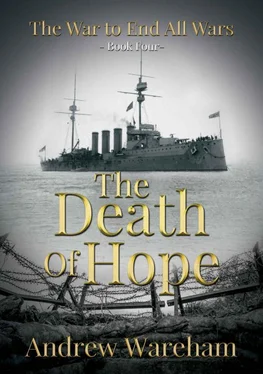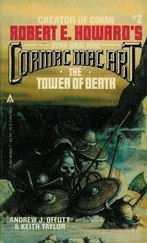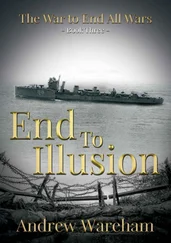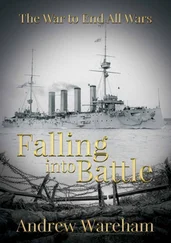“Lost some of the ready ammunition stores, sir. We could use three-o-three rounds and flares, sir. A replacement supply of Mills Bombs as well.”
It would be difficult to prove Richard a liar. A worthwhile risk to take as their stores were lower than he liked. Half a million rounds would be very welcome; a few Mills Bombs would be a pleasant extra.
Braithwaite confirmed that Draper had been put aboard his train and would be in company all the way to Marseille and onto the ship there. There would be no mistaken turns, no getting lost for that gentleman.
“Strange, sir. He was peacetime Army. Why does a man join up if he is yellow?”
“Pleasant life except in time of war, Baker. He was Sandhurst in ’02 or ’03 and then joined the battalion in barracks at Winchester and eleven or twelve years of drill and parades. Infantry, so he would not even be expected to go out hunting in winter. Three out of four weekends in London, in the clubs and theatres and bars and other places – back midday Monday, off Friday morning. A quiet, comfortable life for a single man with an income of his own, the Army a social club as much as anything. Always possible to duck out of an overseas posting – a staff course would do for that. No reason to suppose that his life would ever see danger, then the Kaiser chose to start a bloody war! Even then, he almost managed to dodge the column.”
It was peculiar, Richard thought, went a long way to explaining the attitude of the older officers, the faint air of resentment with which they greeted action at the front. It was not what they had signed up for, though the overwhelming majority responded well to the demands of war.
“Got three wagon loads of blankets for your battalion, just turned up. My people know nothing about them…”
“Cold in the dugouts, sir. Can’t have coke fires in enclosed spaces without killing off the men.”
“I won’t ask how, Baker. They will be on their way up to you within a few minutes.”
The wagons arrived, were rapidly unloaded and counted.
“Two apiece, ‘Major.”
“Yes, sir. Done well by us, so he has, sir. You will note the quality?”
There was no broad arrow on the blankets. They were not War Department issue.
“Thick. Warm and heavy. Meant for a hotel, not for the army?”
“Yes, sir. The woollen mills must still be sending stuff overseas to meet pre-war contracts. They need to earn money, after all. Always the case that English woollens are the best you can buy, sir.”
“Get them issued, quick time, ‘Major. The sooner they are out of sight, the better.”
Carrying parties came from each company, ran back yelling to their mates.
“A few spare, sir?”
“Aid post?”
“Already assigned, sir.”
“Then spread them around the officers, ‘Major. The youngsters especially, those who can’t afford to buy their own comforts.”
O’Grady nodded and set about the task.
“What of yourself, sir?”
“Speak to Paisley. He should have me looked after from my own pocket. Not for me to be dipping my hands in the men’s issue, ‘Major.”
The words were heard and passed on. The Colonel had not taken a one of the blankets, all had gone to the battalion. It all added to their fighting spirit, their willingness to stand for the Regiment. They were special – their officers were better than the poor sods had in other battalions along the line.
The mail arrived, in good time for once, letters for the bulk of the men, very few of them completely alone. Richard sat down to a long missive from Primrose, the entirety adding up to very little – she missed him, hoped he was well, knew that was silly. She had met a Lieutenant Commander Adams recently, believed him to be the man he and his friend Sturton had mentioned as having ‘put up a black’; he was evidently rehabilitated. They had danced and he had mentioned that he would leave the Navy when the war ended; definitely no longer the golden boy. That apart, his father had written her to say that he had purchased a house not so far from Wells-Next-The-Sea with some gardens and a little boathouse of its own; she hoped they would like it.
It was all very domestic and unimportant – a pleasant change from the lines. He waited for the first officer to come knocking at the dugout door. Letters from home were not all enjoyable.
“Come in Caton. What is it?”
“Smith Three, sir. His wife run off with a millhand, earning five times as much as a soldier. Left their two children, four and six year olds, with his mother and her at her wits end to deal with them.”
“What can he do if he goes home for a week, Caton?”
“He doesn’t know, sir. He can’t do anything while he is here. Find his wife and speak to her, I suppose – she can’t have gone far.”
“And likely end up before the beak for bashing her, Caton. No. He stays, I am afraid. Besides, she was obviously just waiting for him to go overseas; she has hardly had time to meet a new lover in the few days we have been out.”
The cases trickled in through the morning. Richard sent one man home for seven days, his father on his deathbed, a chance to see him a last time. The remainder stayed with their miseries.
“The hard part of soldiering, Hawkeswill. Most of the men have only been out for three weeks. Six months at least before they can hope to see a week at home.”
“More like to be a year, sir. The Army is not enthused by the idea of leave. Takes up space on transport that can be better used.”
It was almost cruel.
“War is not in the way of being easy, sir. At least, not as bad as being in South Africa or India. Leave was impossible there. China Station even worse, of course. Something like four battalions in Hong Kong and along the coast and they will be at least five years away from home, possibly longer.”
“Trouble is, Flanders being just a day’s travel away from home, the men feel it ought to be possible, sir.”
There was nothing to be done, regrettably.
The replacement ammunition arrived together with boxes of two hundred flares; it was pleasant to be the Brigadier’s favourites. There was an immediate problem of storage, there being too little space in the dugouts for the mass of rounds.
“Issue an extra fifty thousand rounds to each company, ‘Major. Where they put them is their problem.”
“Yes, sir. The duckboards have arrived, sir. So have six new water pumps.”
There was a strong chance that the Brigadier had written down the wrong figures when taking Richard’s telephone message.
“Right! Put them to use. Under no circumstances are they to go back as surplus to requirement. Which company has the lowest section of trench?”
“D and E together, sir. A clear two foot lower than the remainder, sir. Always a problem with water running down on them.”
“Right. Defaulters to dig new sumps. Big ones. Two pumps to each. The other pair to go to Mr Caton.”
There were always a few men who had committed minor crimes punishable by hours of labour. Now, instead of carrying from the rear at night, they would be given shovels and wheelbarrows.
Richard was if anything glad of the extra labour demanded of the battalion. Too much of trench life was spent in idleness, the men with nothing to do other than sit and wait and drink tea and, inevitably, find mischief to get up to. Now they would at least be tired enough to sleep well, provided the night was not too noisy.
He was called away to Brigade next morning, an orders meeting in addition to the ordinary weekly conference. He took Hawkeswill with him as there would undoubtedly be a mass of paperwork to deal with.
“Baker! Good to see you again. Major Dorrington from the Staff with orders for the next big push.”
Читать дальше












